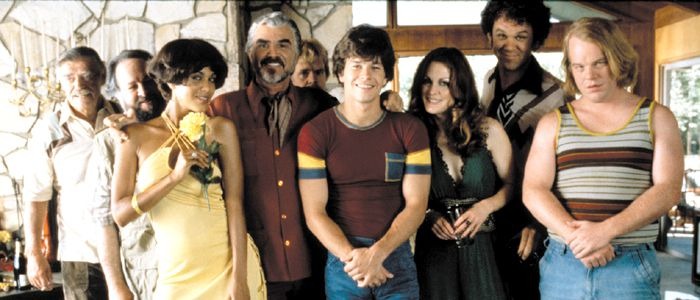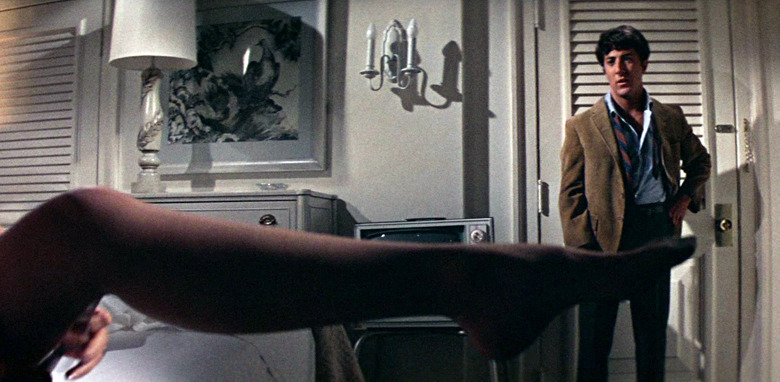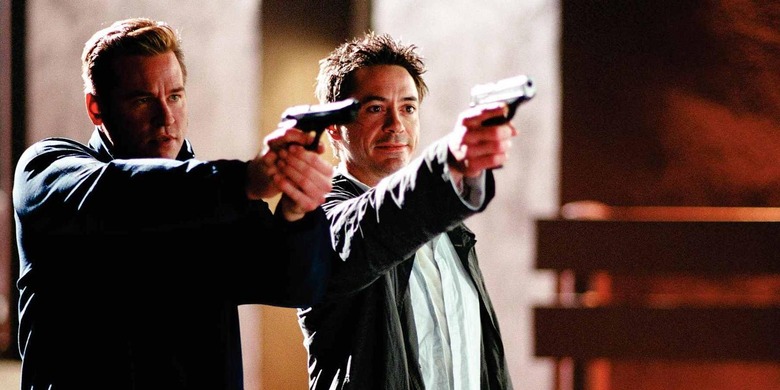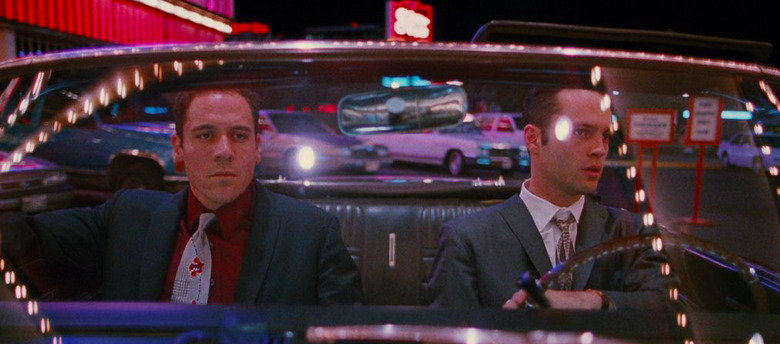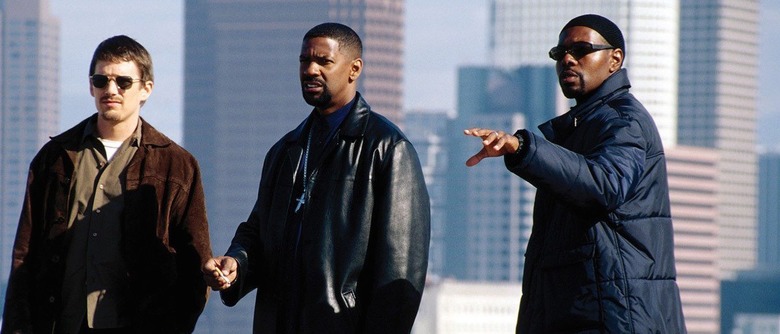Five Movie Commentaries To Listen To In January
While Damien Chazelle's La La Land wears its fondness for old school Hollywood productions proudly on its sleeve, his portrayal of present-day Los Angeles is hardly unflattering. It's a movie so appealing to the eye it's almost impossible to see nothing except beauty in La La Land, but it captures a genuinely lovely part of the city: it's a place a lot of driven and passionate people move to every day.
After seeing the film a second time, it made me want to revisit a few movies set in Los Angeles, including Boogie Nights, The Graduate, Kiss Kiss Bang Bang, and a few others, which all feature some commentary tracks worth listening to.
Below, check out this January's movie commentary recommendations.
Boogie Nights (featuring writer-director Paul Thomas Anderson )
Why Listen: "I think karate and porno is... how I wanna live my life."
I would write this is "sadly" one of the only two audio commentaries Paul Thomas Anderson has ever done, but it's impossible to complain after hearing his one for Boogie Nights. This commentary features a blunt, confident, sincere, and deeply passionate young Anderson discussing his epic sophomore effort. It's obvious he's enjoying reminiscing about the ensemble and days from the shoot. Anderson's love for movies, moviemaking, and the experience of Boogie Nights is always palpable. It's two and a half hours of listening to a brilliant and hilarious storyteller opening about his influences, sharing great stories about his dad, talking about growing up in the Valley and the porn industry, and much, much more.
What's Said: With the camerawork, Anderson wasn't afraid of getting a little flashy. "This is a good story for a lot of show-off moments, and hopefully I took advantage of every single one of them," he says.A Day on the Job: The shot of Dirk Diggler checking out during the "Jessie's Girl" sequence was an unplanned shot and altered the scene, which was originally half as long. "That [shot] was something that just happened," the director says.
It's a funny thing, because we planned the whole fucking sequence out to music but I only planned it out to half of 'Jessie's Girl.' I didn't care about the second half because I knew we'd be out of the house by that point. It turns out, when we kept playing 'Jessie's Girl' over this shot, it got to this wonderful bridge in the song for the whole shootout thing.' I don't know if I explained that well, but it was a massive fucking serendipity and coincidence of laying music into the movie, which I couldn't have fucking planned. I was pretty good at planning the shots out, but not this fucking good.
Trivia: Paul Thomas Anderson's favorite scene is where Rollergirl asks Amber, "Are you my mom?"
The Graduate (featuring director Mike Nichols and Steven Soderbergh)
Why Listen: Steven Soderbergh asks all the right questions. Mike Nichols tells so many funny, honest, and wonderful stories with the (now-out-of-retirement) director. This a rare commentary where it feels like you're eavesdropping in on a conversation. It's a wide-ranging discussion covering the extensive rehearsals, why Dustin Hoffman is a great movie actor, and even Nichols' problems as a young, less patient filmmaker. You get to learn a tiny bit about the Nichols that made The Graduate and the Nichols that sat down with Soderbergh for this lovely conversation, which has a perfect ending. The Graduate director even knows exactly when to end a commentary on a high note.What's Said: When Soderbergh asks Nichols for his thoughts on expectations, and how they play a role in Benjamin and Diane's lives, he responds with:
My experience of expectations in others and in myself has been that, people who expect wonderful things have serious problems and are truly out of touch with reality. The people that I know, including myself to some extent and you [Soderbergh], if I may, who get things done are people with very low expectations or people who fear the worst certainly of themselves and, to some extent, of the world.
I don't know anybody of any significant talent that goes into something saying, 'This is going to be great. I just know it.' That's already not an artist talking. The artist fears the worst, and for good reason. Every time the worst doesn't happen it's a miracle one more time, which I still believe. I mean, I love my life, and I've had the most amazing luck. I can never, ever get used to it. When I go home, I love my home and when I see my wife, who I love, every time I see her, every day I think — it sounds idiotic — why did I get so lucky? What did I ever do to deserve this happiness? It's very, very hard, as you know, to have a high opinion of yourself, sometimes for moments about something you think that you did that's okay, sometimes having to do with your kids that you didn't mess it up completely. I mean, to have great expectations? I think even Dickens was speaking ironically.
A Day on the Job: Nichols credits his unconscious for the film's final scene. The day he shot the scene, he acted poorly, which helped provoke the unforgettable expressions of horror on Benjamin and Diane's faces.
For some reason I could not comprehend, I said, 'Okay, listen, Dustin, Kathryn, we've stopped traffic for 20 blocks. You can't fool around. You gotta get on that bus and laugh. I can't do it over and over again because we're not going to get a chance. Just be sure you laugh and you're happy. They were terrified and deeply upset. I thought, I'm nuts. Why am I doing this to my own actors before the climax? And then when I saw the dailies I thought, Well, that's why. It literally made itself. When we saw it the next day, we thought, Here it is, here's the end of the picture. This terror that's about to happen to them, that was me scaring the crap out of them before we did it. And I didn't know what I was doing, but I did.
Trivia: Mike Nichols wasn't a fan of the first song Paul Simon wrote for the film, so the director asked if he had another one he could use. Simon went away with Art Garfunkel and returned with "Mrs. Robinson," a song originally called "Mrs. Roosevelt."
Kiss Kiss Bang Bang (featuring writer-director Shane Black and stars Robert Downey Jr. and Val Kilmer)
Why Listen: This commentary is almost as entertaining as the movie. The rapport between these three gives a decent idea of why the film works as well as it does. Shane Black, Robert Downey Jr., and Val Kilmer are incredibly quick and always keep things lively. Kilmer might (jokingly) name drop more than he does discuss Kiss Kiss Bang Bang. Pretty much anything Kilmer says makes you lean in, listen, and more often than not laugh. In addition to the humor, you do gain some insight into how the three participants like to work.What's Said: "Robert is a very generous actor," Kilmer says. "He likes acting with actors. And sadly, a lot of actors don't. A lot of actors don't. You ever see a little movie Tom Hanks did where he's acting with a volleyball? That's pretty much every actor's favorite role."A Day on the Job: There's not a whole lot of discussion about specific days, but Kilmer is honest about filming the Russian roulette sequence. "You're dying to tell everyone what happened, aren't you?" he asks Downey with a laugh. "Go on. I'm beyond scrutiny now. You can't touch me. I'll admit, I had a little trouble with the exposition, and then you had a couple of little problems with some lines, Shane, which we talked about changing, and we did, and that's my excuse for asking for cue cards. That's what Robert's alluding to. I didn't end up needing them? Did I, Robert? Did I?"Trivia: Some people actually wanted Black to cut the bullet gag from the script.
Swingers (featuring Doug Liman and editor Stephen Mirrione)
Why Listen: Doug Liman provides great commentaries for aspiring filmmakers. He offers up so much advice and spends a lot of time covering the technical side of things. Liman's commentaries for Go and Swingers are especially enlightening. He says Swingers was "at the end of the day meant to be a resume film," which allowed everyone to take chances and break rules. Liman discusses at length trying to do the best with what the footage he got, in addition to reading books on cinematography on set and taking advantage of unfocused shots, jump cuts, and continuity errors. Stephen Mirrione and Liman frequently mention how limitations led to some of the film's most beloved scenes.What's Said: An important lesson Mirrione, an Academy Award winner who's edited many of Soderbergh's films, learned from Swingers: "It's very easy when you're doing something low-budget like this, where you don't really know what you're doing — you can't ever give up. There's always a way to get around something, there's always a way make something work."A Day on the Job: You can't get a permit to shoot along I-15. When Mike and Trent are sitting in the car and about to head home from Vegas, there were five or six police cars on the other side of the camera. Liman explains:
Luckily, Jon and Vince aren't facing them. One time we projected dailies we heard this lecture from some independent film producer giving, like, a film school for a weekend class. He explained you can film without permits because you just tell them you do have a permit, but it's in the office, and the office is like, a seven-hour drive away. By the time you've come back, the cops have changed shifts. That's what's going on right now. Avram Ludwig, who worked as my A.D. on this and really can accomplish anything, is surrounded by these enormous Nevada state troopers, who eventually figured out what was going on and told us to pack it up, or they'd throw us all in jail.
A lot of the scene was shot as they were pretending to pack the equipment.
Trivia: Favreau wrote the last scene in a day after it was decided the film should end with Mike's friend seeing him happy, not with a phone call.
Training Day (featuring director Antoine Fuqua)
Why Listen: Antoine Fuqua is commentating solo, and like most commentaries with one participant, there's some stop and go. That's not an issue here, though, as Fuqua speaks with confidence and intelligence, explaining the life of an undercover cop, the challenges of shooting in Los Angeles, and the lengths he went to create a sense of authenticity. Fuqua clearly understands this world and did his research. Hearing the director discuss soldiers coming from home Vietnam and becoming cops, like Alonzo Harris (Denzel Washington), and how undercover cops manipulate informants is the kind of information that's as fascinating as all Fuqua's memories from making the film.What's Said: Everyone knows Washington is a great actor, but he also has a hell of a memory.
Denzel can hear something once, and a month later you'll hear him saying it. [Alonzo says] 'You wanna go to jail or you wanna go home?' I think he heard that once from an undercover cop, [named] 'Cool Cat.' You say things around him, he'll absorb it, and throw it at you a month or two months later in a scene. He doesn't write it down. I've never seen him write it down. He becomes his character. Denzel became Alonzo. Every day on set I was dealing with Alonzo, which is, you know, a little horrifying sometimes because you don't know what's going to come out of his mouth. You just roll with it, man. Not only does he stay focused on the story and the scene, he just brings this reality to it. You can't rehearse it, you can't write it in a script; you just need to give him the room he needs.
A Day on the Job: One of the most dramatic and intense scenes in Training Day – Alonzo trying to reason with Jake (Ethan Hawke) after killing Roger (Scott Glenn) – was originally two minutes longer. Washington, showing Alonzo at his most vulnerable, was as powerful to watch on set that day as he is in the finished scene.
If you listen to the words, he doesn't lie to him about anything in this scene. I'm glad we trimmed it down because we got the best out of it, but they did so many things when I shot the scene. Denzel was so sincere. There's one shot I have where his eyes were watery, almost like a tear was about to drop out of his eyes, as he talked to Jake like his son. It was so intense between Ethan and Denzel. Everyone on the set was just captured by these two. This is incredible acting to me: these guys sitting in a car with not a lot of room to move, and to keep you interested and focused. I mean, they've been doing it the whole movie. This is more exciting to me than any action. I love seeing these two go at it.
Trivia: When Terry Crews' character uses the pigeons to warn the neighborhood cops have arrived, it's called flipping pigeons, and it is a deep subculture. Some of these birds cost "about $8,000 a piece" and can represent power or a sign of respect.

